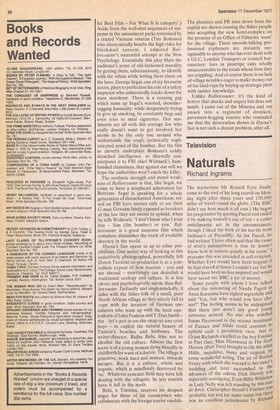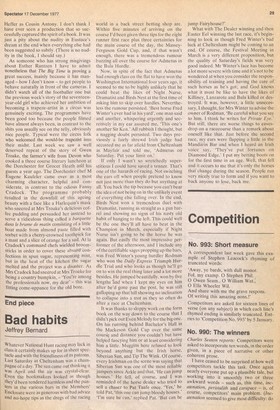Television
Naturals
Richard Ingrams
The mysterious Mr Ronald Eyre finally came to the end of his long search. on Monday night after three years and 150,000 miles of travel round the globe. (The BBC didn't say how much it all cost.) He began his programme by quoting Pascal and ended it by making himself a cup of tea a rather anticlimactic act in the circumstances, though I liked the look of his tea-tin from Jackson's of Piccadilly. As for Pascal, he had written '1 have often said that the cause of man's unhappiness is that he doesn't know how to remain quietly in his room.' I presume this was intended as self-criticism. Whether Eyre would have been happier if he had stayed at home I couldn't say but he would have been no less inspired and would have saved the BBC a lot of money. Some people with whom I have talked about the miscasting of Nicola Pagett as Anna Karenina have sighed regretfully and said 'Yes, but who would you have chosen?' The feeling seems to be widespread that there just aren't any good young actresses around. No one who watched Susan Fleetwood in the second instalment of Eustace and Hilda could continue t° uphold such a pessimistic view. Just as Grant Richards excelled as the boy Eustace in Part One, Miss Fleetwood in The Sistn Heaven (Part Two) brought to life the adult Hilda, impulsive, bossy and virginal, bY some wonderful acting. The air of flushed frenzy with which she reacted to her sister's wedding and later succumbed to the advances of the odious Dick Stavely was especially convincing. Even Billie Whitelaw as Lady Nelly was left standing by this tour de force. Christopher Strauli's Eustace was probably too wet for some tastes but there was an excellent peformance by Richard Heifer as Cousin Antony. I don't think I have ever seen a production that so successfully captured the spirit of a book. It was just a pity about the nudity in Fast ace's dream at the end when everything else had been suggested so subtly. (There is no nudity in the book, I should say.) As someone who has strong misgivings about Esther Rantzen I have to admit nonetheless that The Big Time is proving a great success, mainly because it has managed — how I don't know — to get people to behave naturally in front of the cameras. I didn't watch all of the footballer one btit the previous week's story of the seventeenyear-old girl who achieved her ambition of becoming a trapeze-artist in a circus was genuinely exciting. The programmes have been good too because the people filmed have almost always been, in contrast to the shits you usually see on the telly, obviously nice people. Typical were the circus folk who welcomed the would-be trapezist into their midst. Last week we saw a well deserved repeat of the story of Gwen Troake, the farmer's wife from Devon who cooked a three course literary luncheon at the Dorchester for Grocer Heath arid his guests a year ago. The Dorchester chef M Eugene Kaufeler came over as a most charming character, helpful and considerate, in contrast to the odious Fanny Cradock. The programme probably resulted in the downfall of this ageing beauty with a face like a Harlequin's mask who sneered at Mrs Troake's delicious coffee pudding and persuaded her instead to serve a ridiculous thing called a barquette dans le brume de math; consisting of a little boat made from almond paste filled with sorbet with a cherry-crowned toothpick for a mast and a slice of orange for a sail. At la Cradock's command chefs wielded broomsticks in order to cover these absurd confections in spun sugar, representing mist, but in the heat of the kitchen the sugar melted and the project was a disaster. As Mrs Cradock had sneered at Mrs Troake for being a country bumpkin, — 'You're among the professionals now, my dear' — this was fitting come-uppance for the old bore.



































 Previous page
Previous page